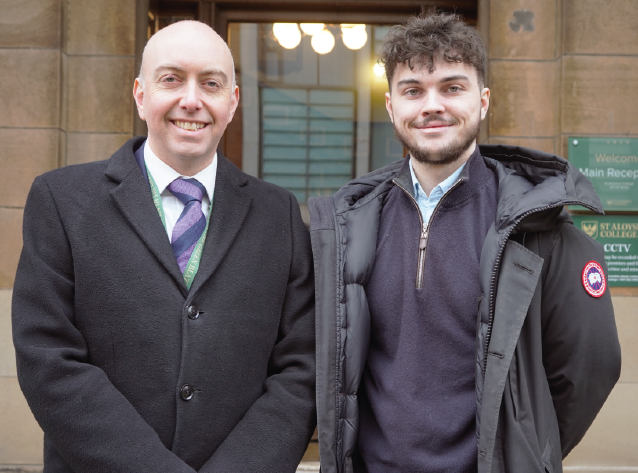Alumni News
OA Charlie McCallum talks RMPS and Studying Law
- Throwback - 1996 Zimbabwe Rugby Tour
- Gold Medal OAs Make History At Commonwealth Youth Games
- OA Performs With NYCOS Chamber Choir
- All About The Climb: OA British Climbing Champion
- OA Careers In Maths: Iain McComish, Class Of '14
- OA Careers In Maths: Imogen West (Class Of '16)
- OA Careers In Maths: James Forester (Class Of '13)
- OA Captain Commemorates Remembrance Day
- OA Awarded Honorary Fellowship From Royal College
- OA Wins BAFTA Scotland Award For Best Feature Film
- Throwback - '94/'95 Rugby Cup Winners
- OAs Join Scotland U20 Six Nations Squad
- OA Charlie McCallum Talks RMPS And Studying Law
- A Trip Down Memory Lane For David And Sanjeev
- Glasgow Screenwriter Swaps Red Carpet For Crime Fighting
- OA Hall Of Fame Prof Bartholomew J McGettrick
- A Helping Hand: Vincent MacEachen (1997)
- Don’t Go Breaking My Heart: Prof John Fraser (1987)
- Oskar Wilkie - Manchester Marathon Achievement

Let me begin by disclaiming that I am not trying to contradict any of the reasons I will tell you about why you should take RMPS; but the fact is, there is no subject you can take at school which would prepare you fully for what you will learn during your first year at law school. In the words of Albert Einstein: “The only thing that you absolutely have to know, is the location of the library”. It’s definitely true that anyone with an innate intellectual curiosity and a strong, resilient work ethic will do well studying law, it’s no coincidence, then, that these attributes are found in the Jesuit pupil profile.
When I was in first year at uni, some people felt they were at a disadvantage to their friends who were on other courses, virtually most first year students studying degrees such as medicine, history, politics, economics; all took Higher and Advanced Higher subjects which gave them a predisposition to take with them to university. But although the SQA may not offer law as a subject like its counterpart in England, RMPS was, in hindsight, invaluable for me becoming a thoughtful and successful law student.
Now, I could use this time to tell you about all the ways that Higher and Advanced Higher RMPS will enhance your critical thinking and essay writing skills, or how it will augment your problem solving and analytical abilities. And whilst it’s true that you would gain all of those skills and more by taking it, you will also able to gain those skills by taking Higher and Advanced Higher history.
What truly differentiates RMPS from those subjects, however, is how it teaches you about the world. The modernisation of legal systems in Western Europe involved a move away from natural law which previously gave legal force to the principles taught by the Catholic Church, towards the enactment of something called positive legislation. For a law to be called ‘positive’, it means that the law is what it says it is, judges apply written rules to cases with no non-legal reasoning involved.
In practice, however, it would be impossible for judges and lawyers to only read what the law says, importantly, they have to understand what the law means. Human rights, also known as fundamental rights, trace their origin from the normative theories of morality in the enlightenment, the fundamental right of privacy found in Article 8 of the European Convention is derived from the teachings of Immanuel Kant, a key theorist you will study if you take RMPS; or the principle of utilitarianism developed by Jeremy Bentham, I can’t tell you how many times I’ve had a professor refer to Bentham when emphasizing a certain legal principle to us.
Therefore, taking Higher and Advanced Higher RMPS, I went to university with not only an intellectual curiosity and a strong work ethic; but I was supported with the theoretical background that contextualized the law in a way that many other law students took a long time to grasp.
As I said before, whilst no subject will prepare you for every challenge you’ll face studying law, RMPS certainty made it a lot easier.
- Charlie McCallum (class of '20)
- OA Charlie McCallum talks RMPS and Studying Law
- OAs Join Scotland U20 Six Nations Squad
- Throwback - '94/'95 Rugby Cup Winners
- OA Wins BAFTA Scotland Award for Best Feature Film
- OA Awarded Honorary Fellowship from Royal College
- OA Captain Commemorates Remembrance Day
- OA Careers in Maths: James Forester (Class of '13)
- OA Careers in Maths: Imogen West (Class of '16)
- OA Careers in Maths: Iain McComish, Class of '14
- All About The Climb: OA British Climbing Champion
- OA Performs with NYCOS Chamber Choir
- Gold Medal OAs Make History at Commonwealth Youth Games
- Throwback - 1996 Zimbabwe Rugby Tour
- A Trip Down Memory Lane for David and Sanjeev
- Glasgow Screenwriter Swaps Red Carpet for Crime Fighting
- OA Hall of Fame Prof Bartholomew J McGettrick
- A Helping Hand: Vincent MacEachen (1997)
- Don’t Go Breaking My Heart: Prof John Fraser (1987)
- Oskar Wilkie - Manchester Marathon Achievement

